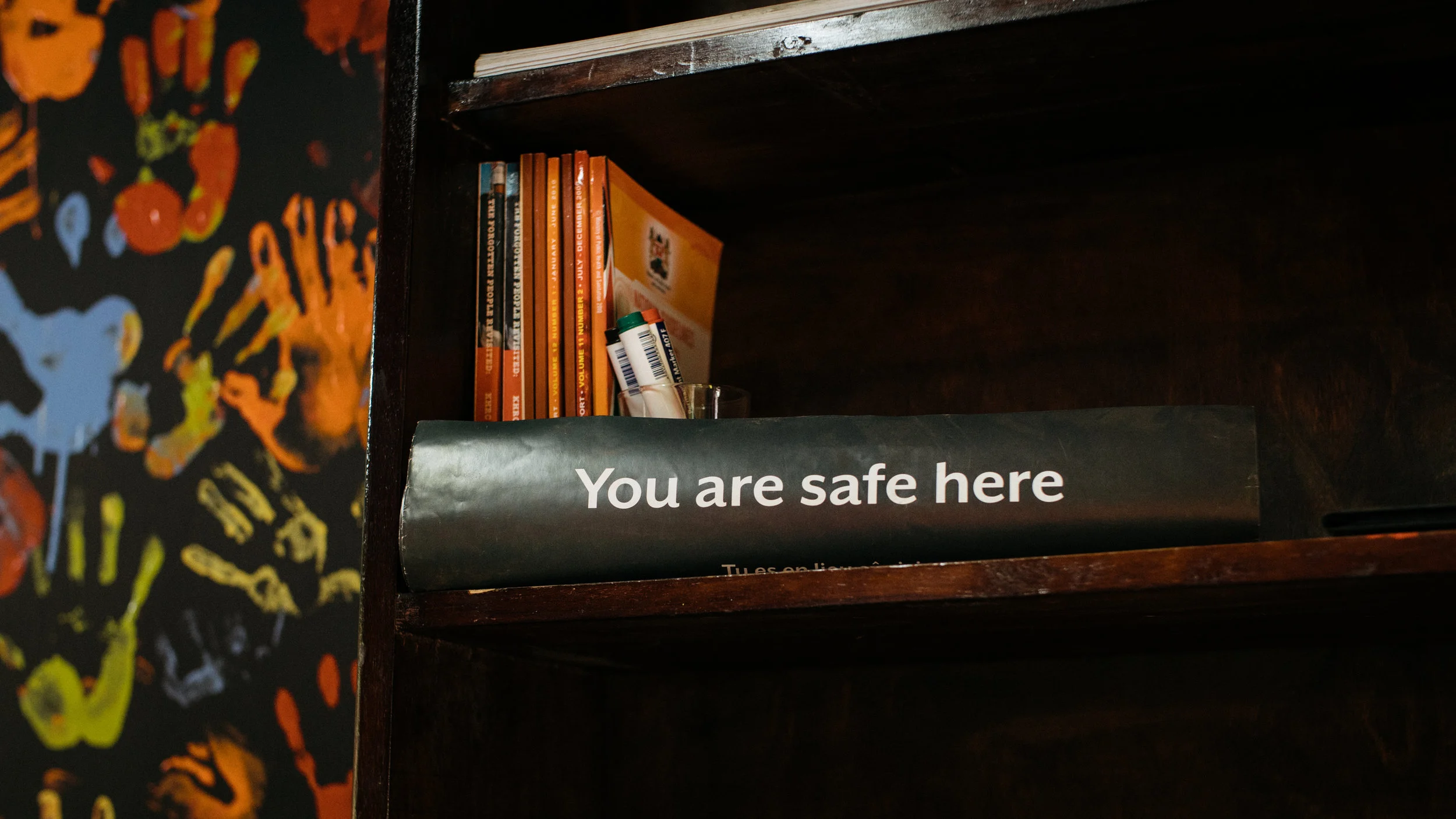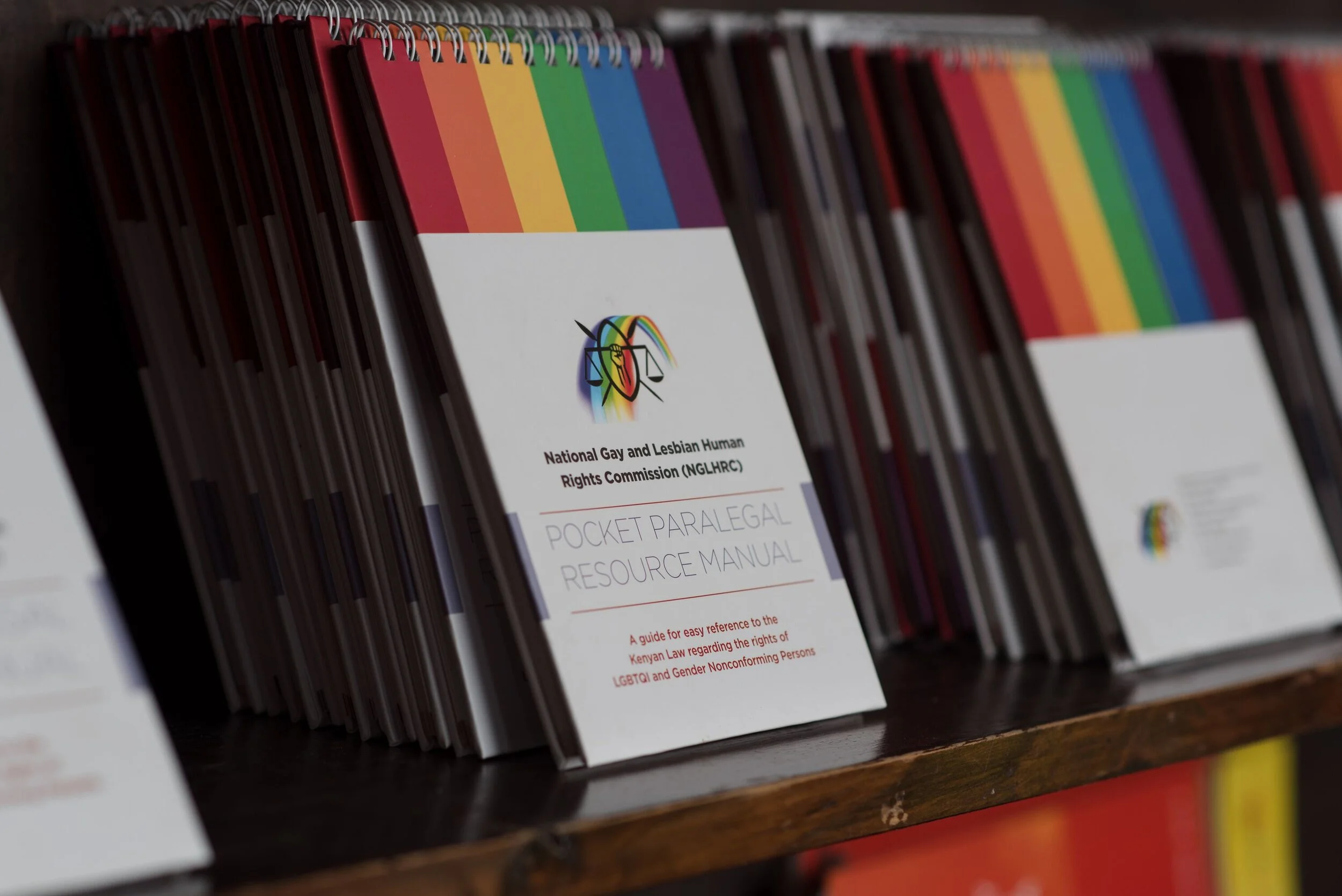



Our Programs
Learn about NGLHRC's Services and Programmes
SCROLL DOWN
Our Programs
Learn about NGLHRC's Services and Programmes
NGLHRC works to ensure that members of Kenya's LGBTIQ community:
can live free and equal lives, and,
are treated with dignity and rights within their community and respective counties.
To find out more about our programmes, please click on a programme on the right.
STRATEGIC LITIGATION
NGLHRC works on litigating cases in the public interest. Since we began litigating in 2013, we have won two cases with significant impact. Find out more.
Legal Aid CentrE
Since 2013, we have been the go-to organization for LGBTIQ legal aid, including security response. We provide daily free legal aid and support to LGBTIQ persons across Kenya in cases ranging from: issues of discrimination, sexual and gender violence, forceful evictions, blackmail and extortion, unlawful dismissals and deed polls. Find out more.
LEGAL AID COMMUNITY OUTREACH
Beginning in late 2017, our Legal Aid Centre has been taking its services to communities that may have less accessibility to our services. With this outreach initiative we have increased reporting of justice challenges and data collection on violations facing the LGBTIQ community. To request a Legal Aid Clinic in your area or for your organization, contact info@nglhrc.com.
Paralegal Training and Civic Education
NGLHRC provides countrywide civic education and paralegal trainings for sexual and gender minorities, and their allies. Through our trainings, we enhance access to justice and bring to life the constitutional right of public participation of LGBTIQ individuals living in Kenya. Find out more.
SENSITIZATION TRAININGS
NGLHRC conducts trainings on the justice challenges and needs of the LGBTIQ persons. This involves training police officers, court users’ committee members (comprised of magistrates, prosecutors, court clerks and investigating officers), health practitioners and others as participants.
Advocacy and Engagement
Through advocacy and public engagement, NGLHRC is changing prevailing attitudes on diversity in Kenya. Together, we are expanding the public space for enjoyment of the LGBTIQ rights we seek to protect. Find out more.
Because WomXn
NGLHRC recognizes that the LGBTIQ movement in Kenya, and across the globe, is not free of patriarchy and sexism. To do our part in remedying this wrong, we provide programming geared specifically towards the needs of LBTIQ women, including the annual Uzima (meaning "wellness" in Kiswahili) Camp. Find out more.

NGLHRC's Guide to Your Rights
NGLHRC's Guide to Your Rights
Police in Kenya are required by law to follow certain rules if you are arrested. Try to keep calm and do not panic. Remember that you have the right to be treated fairly and with respect.
NGLHRC has prepared a rough guide to your rights as an arrested person and to a fair court hearing. Click here to get to know them.

EMERGENCY CONTACTS:
CALL US: 0204400525 (Country Wide)
CALL UNHCR: 41 22 739 7280 (Nairobi)
CALL SALINA: +254 704 256 918 (Kisumu)
CALL MAAYGO: +254 725 734 542 (Kisumu)
CALL HOYMAS: (+254) 714 781 000 (Nairobi)
CALL POLICE: 020-225685 (Nairobi Central Police) 020-603694 (Lang'ata) 020-560533 (Kileleshwa) 020-786878 (Buruburu) 020-8560756 (Kasarani) 020-2721692 (Capital Hill) 020-560921 (Riruta)
Safe areas in town (Nairobi). If you feel threatened or unsafe, there are places that have been tested and others that are relatively safer than others.
The City Clock at Kencom-Moi Avenue junction - There are matatu operators who work all night and the KCB Bank just behind it is manned by armed police officers. You can hang around here while waiting for help or calling for one.
State House road and University Way junction (roundabout) - There is good lighting and regular movement of people (from University of Nairobi and the Churches in the area). The junction is also near armed traffic police and armed police guarding property in the area. Hanging around here can help you feel safe and control any threats without having to tell anyone about your sexuality and/or gender identity.
Kenyatta Avenue, Simmers area -There are several groups of plain-clothed police officers seated in cars disguised as parked cars or taxis. They offer property security, maintain order and surveillance. Security guards in this area know them and can help get you to safety without revealing your sexuality or gender identity.
TIPS FOR PERSONAL SAFETY AND EMERGENCY CONTACTS
As a community, NGLHRC understands that sometimes revealing your gender and/or sexual identity may be uncomfortable or unwanted. Here are some general tips for keeping information about your gender and/or sexuality private and for staying safe in public.
Travel around light. A lot of bags means you need to pay more attention to your luggage. When meeting new or old friends, you are likely to divide this attention and forget some of your stuff. If it was a passport or phone for example, anyone who finds it can easily find out a lot about you.
Turn off Data Exchange. When connecting your phone to someone's laptop via a USB data cable, be sure to turn off the Data Exchange button from your phone. Some people have apps that can copy your personal data as soon as your phone is connected to their laptops. If possible, only plug your USB cable into a computer of a trusted person to charge your phone.
Watch your words. Most of us speak on the phone when in taxis because we feel comfortable. Most assume that taxi drivers do not understand the topic of the phone call because they don't look like they are paying attention or don’t act like it. But several taxi drivers are familiar with words like "kuchu" and “shoga."
Do your research. When invited to an event like a friend’s party or a cousin's birthday party, try to find out whether there are any gay-friendly people attending. You don't want to end up feeling weird amidst some family members because of your identity or fall in the hands of drunk homophobic people.
Go out with someone you trust. When going out as friends or with a larger group, try to have at least one person in your group who can watch over and help with moderation. Some of our involuntary expressions of sexuality and gender identity can leave clues to our identities. This person can help inform the group if they are being too expressive and/or its time to leave.
Always know where you are going. If not, be sure about the directions. Also make sure that someone you trust knows where you are going and who you are going to meet. You can leave their contacts behind too.